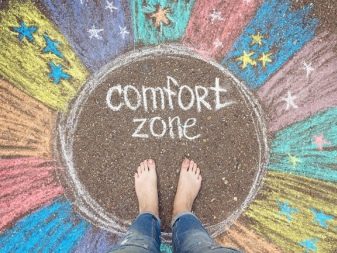What is a comfort zone and how to get out of it?

More and more often today you can hear advice to get out of your comfort zone. But the widespread use of this psychological term does not make it understandable even for half of those who use it from time to time. This article will tell you about how pleasant and dangerous this zone can be, whether you need to leave it.
What it is?
In psychology, the "comfort zone" - a special definition, implying that personal part of the living space in which the most safe and comfortable conditions are created for a person. In simple terms, the comfort zone is a state of psychological comfort, calmness, confidence in the present day and tomorrow. It has a special personal scheme, laws that make a person understand that he is completely safe. The actions of an individual are predictable, understandable to himself, natural, during communication or certain habitual manipulations, he knows exactly what result he can count on. This instills in him calmness and relaxation, reduces the stressful background.
From this point of view, the comfort zone is a universal human value, since its presence tells a person about some kind of stability in his life... But there are also disadvantages. If you stay in this zone for a long time, you get a clear understanding that personality development has stopped, slowed down, everything is so stable and predictable that a person no longer needs to set goals, achieve them, work on oneself, and improve. He is in happy stagnation, like in a swamp.

Once you understand this, you realize that it is time to change something, not to succumb to the deceitfulness of the comfort zone, because it not only slows down many processes, but also poses a certain danger. So, for years a person may not change anything, enduring the humiliating attitude of his superiors, low salary, and all because this is his comfort zone, and she deftly deceives with a sense of false stability and fear of losing "and a tit in his hands."
The fear of leaving the zone that is comfortable for him makes a person maintain relationships with friends who have long ceased to be interesting to him and even drag him down to the bottom. The fear of losing the visible comfort of the existing zone prevents a person from breaking off unproductive and unhappy personal relationships, divorcing, refusing to meet with a lover or mistress, and trying to find true happiness.
That's why a psychological quagmire, called a comfort zone, is considered a negative state that needs correction... In any case, this is exactly what Russian psychologists and psychotherapists say. Their foreign colleagues do not always agree with them.
European experts do not see anything harmful in the zone, believing that the only thing that needs to be done is to expand its borders, and not leave it. Both points of view have every right to exist, and both have their supporters and opponents.


How does it work?
Each has its own, individual, comfort zone. No two are alike. For one it is a familiar old armchair and a blanket, for another - a cozy parental home. Whatever your comfort zone is, it will work according to certain laws. First of all, it cancels any willingness to act, adapt, adjusts to habitual patterns of behavior and actions "on the machine." Thus, a zone can be considered a special state of mind, which we begin to experience when we find ourselves in certain circumstances.
A mentally and emotionally healthy adult does not manage to "get stuck" in stagnation for a long time, without much effort, he smoothly leaves the comfort zone, enters it, expands the boundaries, brings something new into the usual course of things in his life. But there are not so many healthy people, alas. Most are prone to stress, and therefore escape to a comfortable zone becomes habitual for them, and one day they get stuck there, starting to stubbornly and steadily degrade. The zone operates on an ancient human adaptation mechanism. We get used to everything and stability too. And even if at first something in it seems uncomfortable, unacceptable, uncomfortable, staying inside, we get used to it and begin to perceive this reality as the only normal one.
On a conscious level, a person realizes that he is mired in. So why isn't he doing anything? And here the deep mechanisms work. When thinking about goals that lie outside the delineated zone, a person begins to understand that this will require fundamental changes in reality.... At a deep level, ancient instincts say that “there” is potentially dangerous, since the results from going “there” are unpredictable and cannot be calculated by the usual scheme. A person immediately begins to experience stress with all his hormonal emissions and “turns on” the unconscious defense, plunging deeper into his “swamp” and erecting a three-meter fence around it. The stress immediately recedes, the feeling of comfort returns. Motivation goes out, the person feels that he has made an attempt to go outside, and the fact that it is unsuccessful does not bother him much, and he calmly remains in the zone until the next "motivational attack".
Over time, the frequency of such "insights" becomes increasingly rare.


Do I need to go out?
There is no universal answer to this question. The fact is that experts in the field of psychology often advise everyone in a row to go beyond the usual, arguing that this is incredibly useful. But more cautious and even wary psychotherapists, dealing with borderline mental states and disorders, assure that all progress occurs individually, and if a person has serious objective problems at the moment, it is better to leave everything as it is. Anyway, until the problems are solved. Otherwise, you can "run into" not only a temporary disorder, but also a permanent mental deviation.
It should be noted that for most people who do not have significant external problems and prerequisites for mental complications, leaving the comfort zone will not hurt and even help in self-improvement, relationships, career, self-realization... Often life itself throws us out of a comfortable "swamp", some events occur that radically violate the usual mechanical reactions and actions: divorce, partner departure, sudden dismissal, death of a loved one and other serious shocks. Usually, if you observe carefully, this happens precisely when the person is already on the verge of or in the process of personal stagnation. So life forcibly forces us to move forward, further, to reach new heights. But is it worth waiting for troubles and "kicks" from the outside, if you can start positive changes on your own?
Exit steps are worth taking for a number of reasons. Human needs are growing. And even if it seems that nothing in life is changing, needs still increase, and it is important for a person to keep up with them. Here are some illustrative examples. As a child, we were happy when they turned on a cartoon and gave us candy. As we matured, we stopped feeling the same delight from watching an animated film and candy, our needs became different. These metamorphoses occur continuously throughout the course of life. Previously, travel and overseas cruises were a luxury, something unseen and unattainable, but today, according to statistics, every third inhabitant of the planet invests in travel from time to time. Is it just globalization? Or is it, again, in changing the forms of needs?
Leaving our comfort zone encourages us to act, study, acquire new experiences, always aimed at meeting growing needs. A person does not feel that life is flowing past him, he is in the flow, in its very center.

How can you get out?
There are many ways the main thing is to clearly understand the need and start acting. The current reality is far from the only way of development, there are still a lot of options for events, and one should not be afraid to leave such a familiar and predictable "swamp" in order to receive amazing, wide opportunities as a reward.
Most often, experts recommend act when leaving your comfort zone according to a clearly outlined plan of action. We remember those "traps" that our unconscious "I" will set, and these will be fears and uncertainty, stress. A plan is needed to force yourself to overcome stressful responses. If it does not work out, at this stage another unsuccessful attempt to exit or expand personal comfortable space usually ends.

Target
If you do not have a goal, then there will be no "lighthouse", an important landmark that will help expand the boundaries of a comfortable space. Write down all the goals that you would like to achieve, no matter how strange or incredible they may seem. Remember to formulate your goals correctly. There is no goal to buy a car, but there is a goal to gain freedom of movement, to be able to travel by car. Can't be the target of millions of dollars. The goal is to live in abundance, to afford expensive purchases, and a million is one of the tasks. If you want, then the task is for you. Just calculate the required amount of funds and start looking for their source - a new job, a part-time job, play the lottery.
Learning to set goals is not that difficult. Ask yourself why you generally need this or that desired - money, connections, relationships, opportunities? The answer will be the statement of the goal. The more goals you create, the better. Distribute goals according to the deadlines, if necessary, set certain deadlines for yourself, this will help to cope with fears when leaving, and will also be an excellent exercise in goal-setting.
Be sure to write the goals on paper, you must see them, keep them at hand.

Motivation
More often imagine what you will get, what you will become when the goal is achieved, fix your feelings, remember them. This will become the basis of motivation. As soon as there is a desire to drop everything and return away from stress back to the usual psychological "quagmire", reproduce these feelings in your memory, they will become "anchors" that will help you return to the desired course.
Motivation without goal-setting is impossible, which is why this is the second stage in the work of expanding and leaving the comfort zone. If there are problems with the will, it is worth acquiring reliable partners and associates. Share your goals and ideas with loved ones, friend, girlfriend, loved one, but immediately agree with him that you can change your mind halfway through, ask him to persistently guide you towards the goal, despite violent protests. Motivation is especially facilitated if a colleague decides to move towards the goal with you, will attend training sessions, classes, Mongolian language courses, a dance group, a dental clinic, a driving course or a survival school in extreme conditions with you. He will cheer you up when you feel bad, calm you down when fears start to prevail, and shame you in the end.

Graduality is important
As in any important business, you should not skip your personal psychological "bog bumps" at a gallop. Leaving the comfort zone requires consistency, moving from stage to stage, finding errors, analyzing changes, adjusting plans. This work is not done in a swoop. The faster the start, the higher the probability of making critical errors. We act gradually, moving from goals to the formation of motivation, from easy goals to more complex ones. Stick to the plan you have drawn up, meet the deadlines. Remember that a rapid exit from a comfortable space increases the likelihood of a mental disorder, a nervous breakdown.
But do not try to justify your inaction by gradualism.... If you feel that you can do more, but slow down, justifying it by the fact that a smooth expansion is recommended, then, in fact, you have a problem - either with goals, or with motivation, or with both.
Alternatively, this may be another game of the unconscious part of the mind, which, in this way, with deliberate slowness, tries to protect your personality from the stress and fear of the unknown, located on the other side of your personal swamp.

Don't go to extremes
If you've spent half your life with a book on the couch, obviously you shouldn't immediately run to the nearest airfield to jump with a parachute... If you have never played sports, you should not put the first goal of lifting a barbell, the weight of which exceeds yours by one and a half times. Extremes are another danger to be aware of in advance. The first positive shifts are usually pushed to extremes.
As soon as we feel that the exit has not become a deadly trick and even brought new pleasures, allowed us to feel the taste of life that you have already forgotten, control over the growth of needs can be minimized. The body will begin to demand adrenaline, and this threatens with unpleasant consequences, injuries, mental breakdowns. You should not rush headlong into the new, giving all your strength, experiments with new relationships will not lead to success if there are a lot of them, and you won’t earn all the money.
Control yourself, write down every day the changes that have happened to you in your personal diary. As long as you formulate the feeling into a word. objectivity, the adequacy of the perception of reality increases, which is what we need.

Age is not a hindrance
There is no age limit to expand your comfort zone. An example of this can be pensioners who, only after going on a well-deserved rest, discovered the world, new hobbies, got married, and achieved significant success in any field. There are a great many such examples.If age bothers you, make for yourself a selection of information about people who, at your age, managed to change their usual life. Think about them more often, watch biographical films, read books. This will provide additional motivation.
Usually, older people have more difficulty crossing the boundaries of their comfort zone. It is difficult for them to change their usual actions, attitudes, their own attitude, they are more prone to fears and even phobias. It is more difficult for them to set goals, because it often seems that it is either too late to achieve something, or there is no point.
If so, you should seek help from a good psychologist or psychotherapist. These specialists will help you identify goals, outline plans, and become reliable allies in the upcoming positive changes.

In short, this is the basis of the technique for getting out of the comfort zone. As for practical tips, here they are.
- Expand your social circle... Even if you are an introvert with experience, it is worth allowing new communication into your life. Let it be communication on the Internet for a start, gradually bring it out to neighbors, strangers in the store, at the bus stop, on the street. Remember that expanding the circle of communications opens up additional opportunities in achieving your goals, because among new acquaintances there may be very useful people who will help.
- Travel. It is not necessary to immediately go into debt and buy a ticket to distant hot countries. Traveling does not require large capital at all. Start with a weekend trip to the neighboring city, see its sights, museums, go to the theater, cafes. Take a sortie into the woods. Only one condition is important - the place must be unfamiliar, you should never have been there before. It is this factor that will provide novelty of sensations and new experience.
- Add little things to your life every day. We are talking about something that does not significantly violate the boundaries of the "swamp", but nevertheless creates a feeling of novelty. Try to cook a new dish from the usual set of products. The action is simple, but the effect is colossal. Instead of a romance novel, choose a detective story or a thriller to read in the evening. Buy new shoes, even if the old ones are still "anywhere".
- Expand your potential. If a job change is not planned, then ask the manager to supplement your usual duties with something new, something that you did not have to do before. Participation in a new project, a new position, and even a change in the work schedule will certainly help to experience the flow of life differently, more fully.
- Change your daily routine. You shouldn't do it drastically, but small adjustments won't hurt. Add an hour-long walk in the park to your day, don't be afraid to ruin false stability and dangerous comforts by forcing yourself to take an evening walk before bed. If it's incredibly difficult to do, which is very, very likely, get a pet, such as a puppy. You will have to walk with him in any case.
- Learn to... New knowledge and skills never hurt. It doesn't have to be quantum physics or the basics of microbiology. Sign up for a foreign language course, knowledge of it will come in handy both when traveling and in looking for a new, more promising job. Learn to knit, embroider, fold pictures of amazing beauty from rhinestones, sculpt from clay, allocate at least an hour a day for training, use any opportunities for this - books, manuals, webinars, training videos, articles by professionals. An important condition is that your training course must be intensive enough to achieve the effect of leaving your comfort zone.
- Take yourself to the next level. By this time you already have a layer of knowledge, skills, and abilities. Raise them to a new level, improve, use the advice of experts, communicate in interest groups, read specialized literature.
- Solve old problems. The period of leaving your comfort zone is a good time to tackle problems that have been postponed for a long time. "Then" came.
Each problem solved will bring moral and psychological satisfaction, more than compensating for the hormonal stress attack.










